Business Intelligence Analysts are at the heart of data-driven decision-making. They transform complex data into actionable insights that help businesses improve strategies and performance.
The role requires a blend of technical skills such as data analysis, proficiency with BI tools like Tableau or Power BI, and soft skills including critical thinking and effective communication.
Candidates can write these abilities in their resumes, but you can’t verify them without on-the-job Business Intelligence Analyst skill tests.
In this post, we will explore 8 essential Business Intelligence Analyst skills, 9 secondary skills and how to assess them so you can make informed hiring decisions.
Table of contents
8 fundamental Business Intelligence Analyst skills and traits
The best skills for Business Intelligence Analysts include Data Analysis, SQL Programming, Data Visualization, Business Acumen, Problem Solving, Data Warehousing, Report Generation and Predictive Analytics.
Let’s dive into the details by examining the 8 essential skills of a Business Intelligence Analyst.
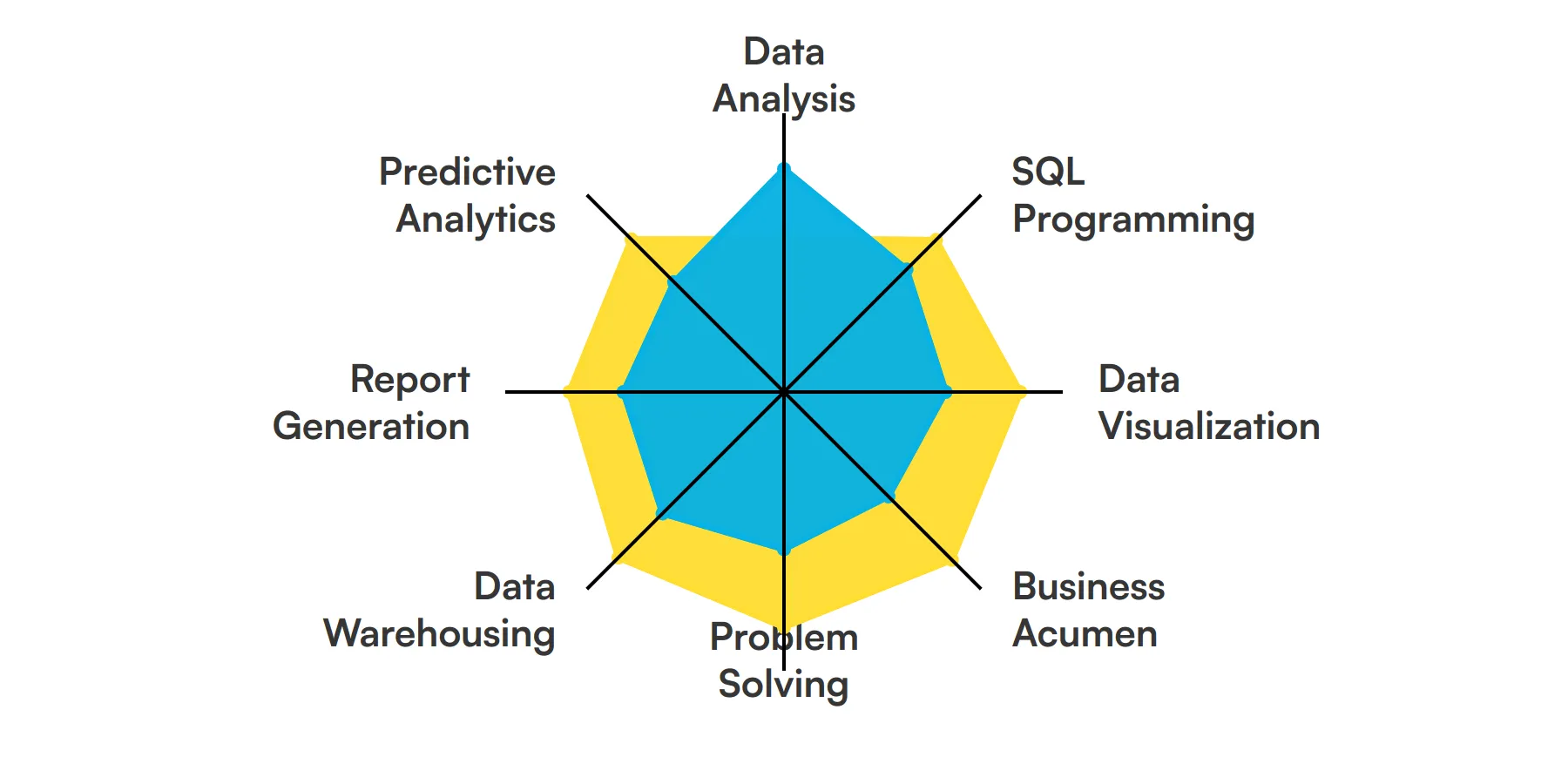
Data Analysis
Data analysis is central to a Business Intelligence Analyst's role, involving the interpretation of complex data sets to identify trends, make predictions, and drive business decisions. This skill requires proficiency in statistical tools and software to transform raw data into actionable insights.
For more insights, check out our guide to writing a Data Analyst Job Description.
SQL Programming
SQL is the backbone for managing databases. A Business Intelligence Analyst uses SQL to retrieve, manipulate, and analyze data, making it a critical skill for creating reports and supporting data-driven decision-making processes in the organization.
Data Visualization
Data visualization involves creating graphical representations of information. Business Intelligence Analysts use tools like Tableau or Power BI to design dashboards that make complex data more accessible and understandable to stakeholders.
Check out our guide for a comprehensive list of interview questions.
Business Acumen
Understanding business operations and strategy is key for a Business Intelligence Analyst. This skill ensures that data analysis is relevant and aligned with the organization's goals, helping to inform strategic decisions effectively.
Problem Solving
Problem solving is crucial as it involves identifying issues within data sets and devising strategic solutions. A Business Intelligence Analyst applies this skill to ensure data integrity and to optimize the impact of business intelligence findings.
Data Warehousing
Knowledge of data warehousing is essential for a Business Intelligence Analyst to manage and retrieve data efficiently. This includes understanding how data is stored, organized, and accessed in large-scale databases.
For more insights, check out our guide to writing a Data Architect Job Description.
Report Generation
Generating detailed and accurate reports is a daily task for a Business Intelligence Analyst. This skill involves summarizing findings and presenting them in a clear, concise manner to aid in decision-making.
Predictive Analytics
Predictive analytics enables Business Intelligence Analysts to forecast future trends based on historical data. This skill involves using advanced statistical techniques and models to predict outcomes and inform business strategies.
Check out our guide for a comprehensive list of interview questions.
9 secondary Business Intelligence Analyst skills and traits
The best skills for Business Intelligence Analysts include Machine Learning, ETL Knowledge, Cloud Computing, Collaboration Tools, Project Management, Statistical Software, Data Governance, User Experience and API Integration.
Let’s dive into the details by examining the 9 secondary skills of a Business Intelligence Analyst.
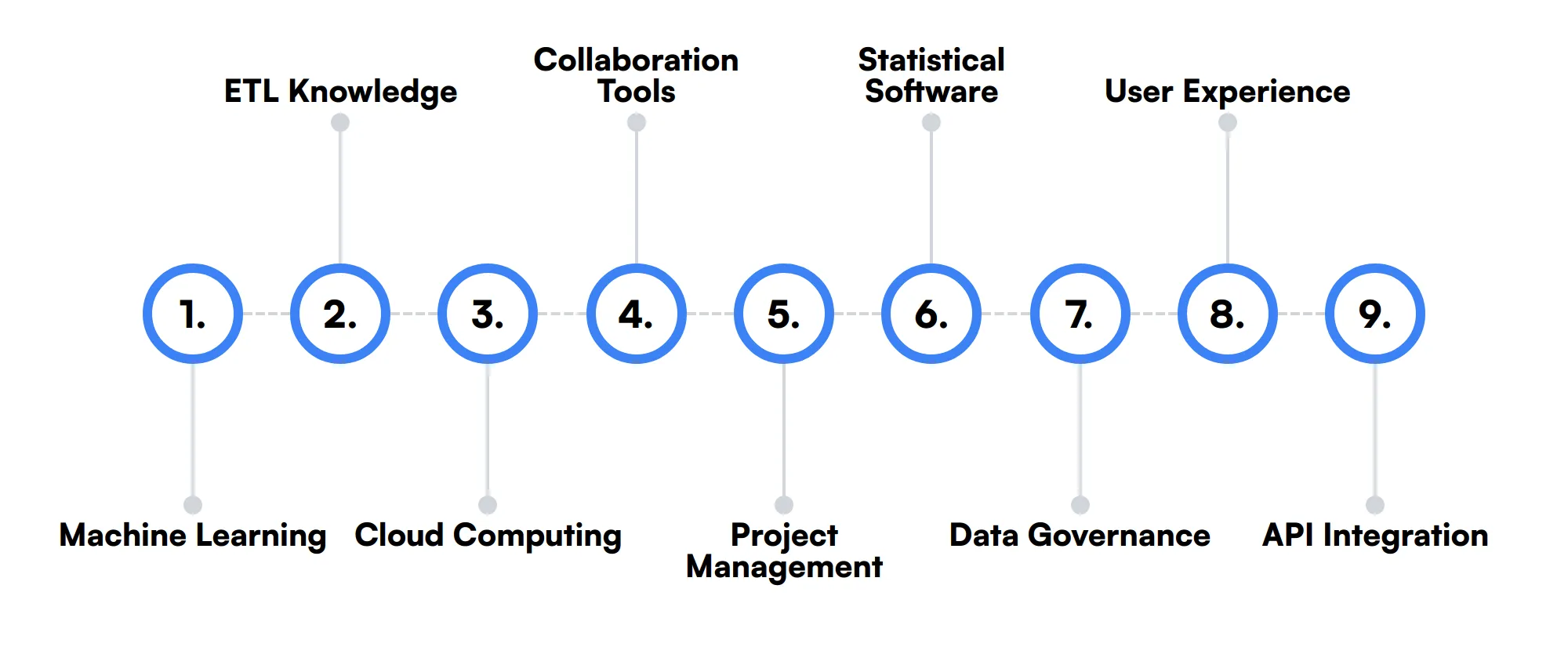
Machine Learning
While not always central, understanding machine learning can enhance a Business Intelligence Analyst's ability to perform complex data predictions and automate data analysis processes.
ETL Knowledge
Experience with Extract, Transform, Load (ETL) processes is beneficial for managing data workflows and ensuring that data is accurately collected, processed, and stored.
Cloud Computing
Familiarity with cloud services like AWS or Azure can be advantageous for Business Intelligence Analysts, as more organizations move their data operations to the cloud.
Collaboration Tools
Proficiency in collaboration tools such as Microsoft Teams or Slack is useful for communicating with team members and stakeholders, ensuring that insights and data-driven recommendations are effectively shared.
Project Management
Basic project management skills help Business Intelligence Analysts to oversee BI projects, manage timelines, and ensure that deliverables meet business needs.
Statistical Software
Knowledge of statistical software like R or Python for statistical computing can provide a Business Intelligence Analyst with additional tools to perform more sophisticated data analysis.
Data Governance
Understanding data governance principles is important for ensuring that data is handled ethically and in compliance with regulations and company policies.
User Experience
Skills in user experience design can help Business Intelligence Analysts create more intuitive and effective data visualizations and BI tools.
API Integration
Skills in API integration are useful for automating data flows and enhancing the capabilities of business intelligence systems.
How to assess Business Intelligence Analyst skills and traits
Assessing the skills and traits of a Business Intelligence Analyst involves more than just glancing at their resume. It's about understanding how well they can manipulate and interpret data to drive business decisions. A comprehensive evaluation process is key to identifying the most capable candidates.
While technical skills like SQL programming, data visualization, and predictive analytics are measurable through tests, traits such as business acumen and problem-solving require a deeper look. This is where practical assessments play a crucial role. By simulating real-world business scenarios, you can see how candidates apply their skills to solve complex problems and generate insightful reports.
Using tools like Adaface assessments, which are designed to mirror actual job tasks, can significantly streamline the screening process. These assessments help in identifying candidates who are not only technically proficient but also excel in applying their knowledge practically, thereby potentially improving the quality of hires.
Let’s look at how to assess Business Intelligence Analyst skills with these 6 talent assessments.
Data Analysis Test
Our Data Analysis Test evaluates a candidate's ability to analyze and interpret data, crucial for roles requiring the extraction of actionable insights from raw data sets.
The test covers a range of topics including data modeling, SQL queries, and data interpretation using charts and graphs, designed to assess the candidate's practical skills in handling and analyzing data.
Candidates who perform well on this test demonstrate a strong ability to predict outcomes, detect anomalies, and use popular data tools like Excel effectively in business scenarios.

SQL Online Test
The SQL Online Test assesses a candidate's proficiency in SQL, a fundamental skill for database management and manipulation.
This test evaluates the candidate's ability to design databases, perform CRUD operations, and write complex queries involving joins and subqueries.
High-scoring candidates will show a deep understanding of database efficiency, security measures, and the ability to handle complex data retrieval and management tasks.

Tableau Online Test
Our Tableau Online Test gauges a candidate's expertise in Tableau, a leading tool for data visualization and business intelligence.
The test challenges candidates to connect with multiple data sources, manage and analyze data within Tableau, and create impactful visualizations and dashboards.
Successful candidates will demonstrate proficiency in using Tableau's features for data sorting, filtering, and publishing, ensuring they can deliver comprehensive data insights.
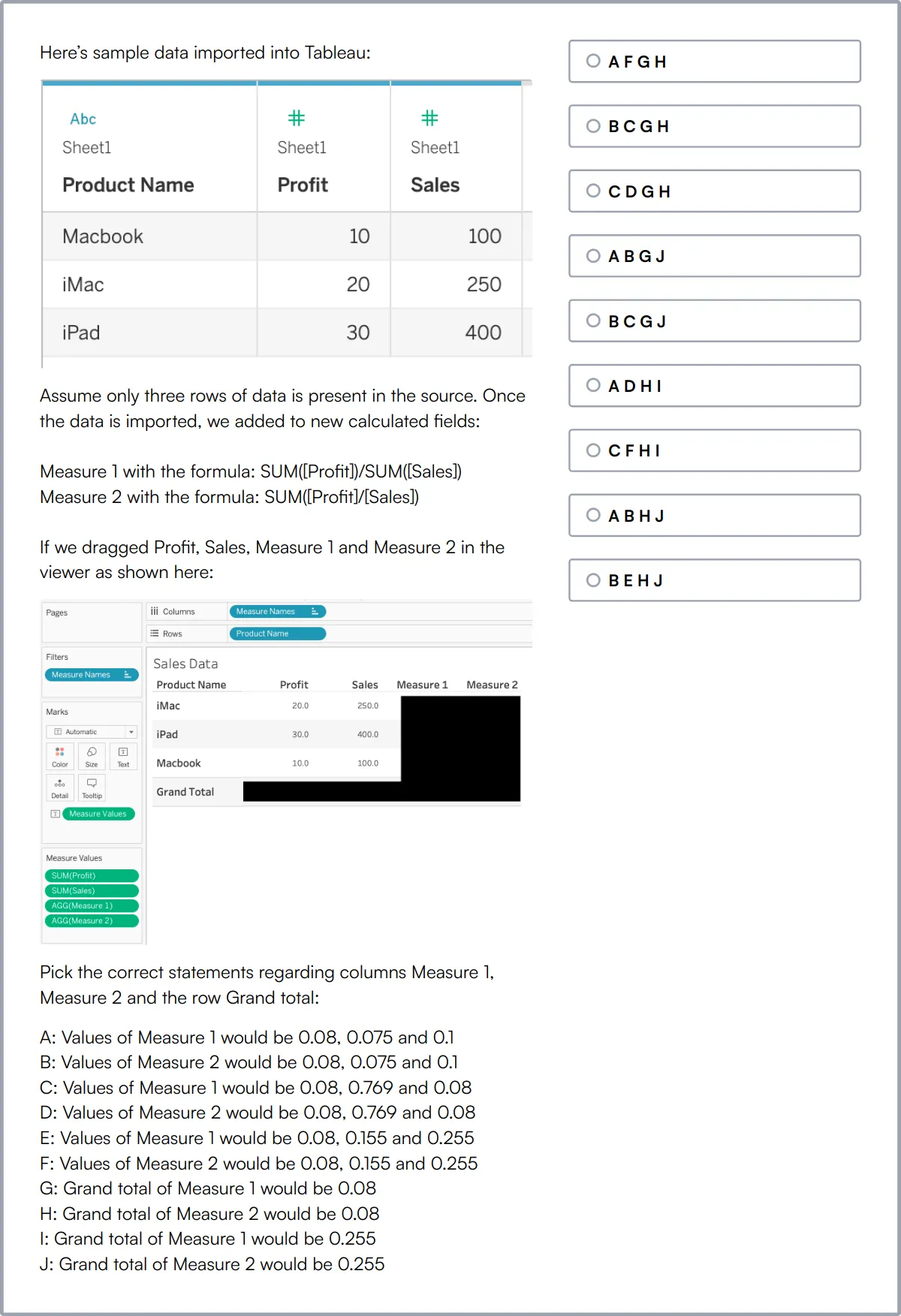
Data Interpretation Assessment Test
The Data Interpretation Assessment Test evaluates how well candidates can analyze and draw insights from data visualizations such as graphs and charts.
This test assesses the candidate's ability to read and interpret complex data sets, a necessary skill for roles that require making informed decisions based on data.
Candidates excelling in this test can effectively translate data into actionable insights, an essential skill for strategic decision-making in business contexts.
Problem Solving Test
Our Problem Solving Test assesses a candidate's reasoning and problem-solving abilities, which are key for analytical roles.
The test includes various types of reasoning such as logical, abstract, and critical thinking, challenging candidates to apply these skills in complex scenarios.
High performers in this test are typically adept at analyzing situations, identifying patterns, and devising effective solutions under pressure.
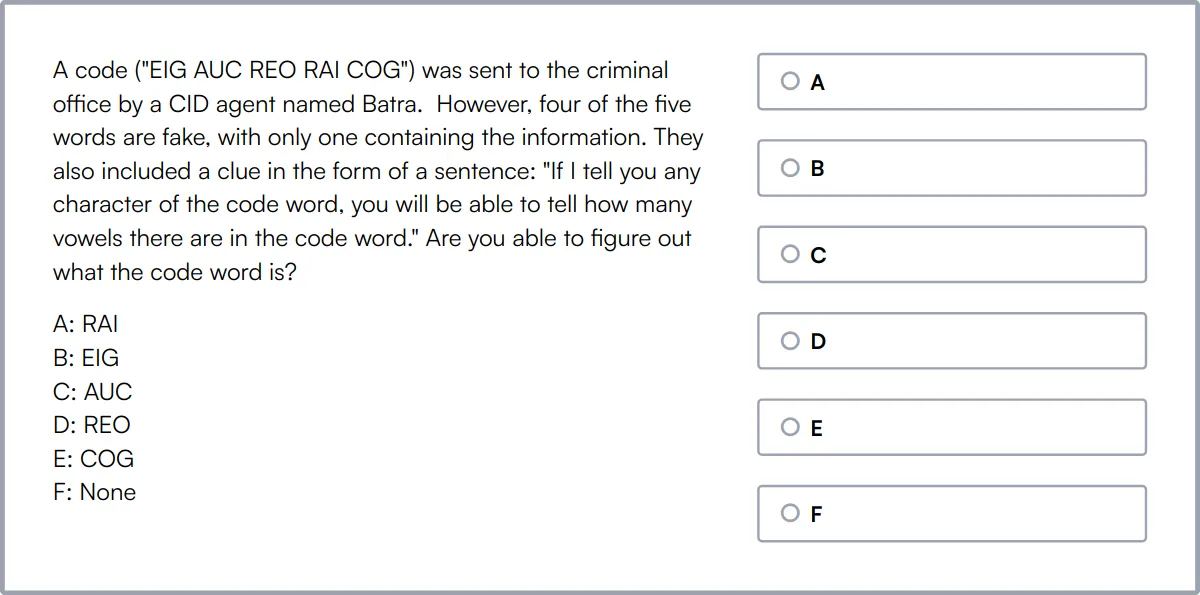
Data Warehouse Online Test
The Data Warehouse Online Test measures a candidate's knowledge in data warehousing, essential for managing large-scale data storage systems.
This test evaluates skills in SQL, data modeling, and ETL processes, crucial for building and maintaining efficient, scalable data warehouses.
Candidates who score well are likely proficient in optimizing data storage, retrieval, and in ensuring data integrity and security within organizational data ecosystems.
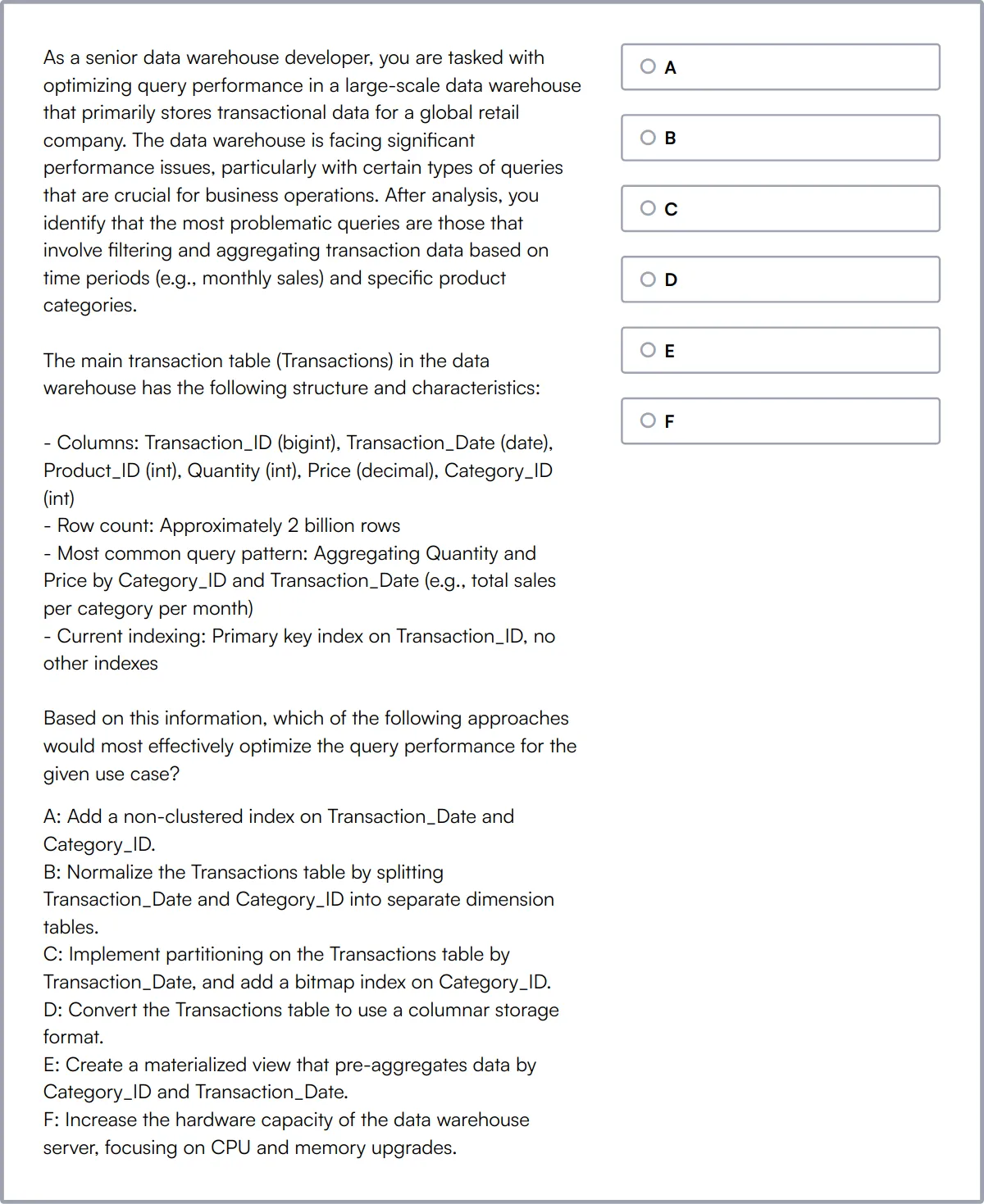
Summary: The 8 key Business Intelligence Analyst skills and how to test for them
| Business Intelligence Analyst skill | How to assess them |
|---|---|
| 1. Data Analysis | Evaluate a candidate's ability to interpret and derive insights from data. |
| 2. SQL Programming | Assess proficiency in writing optimized queries and managing databases. |
| 3. Data Visualization | Check ability to create clear, impactful visual representations of data. |
| 4. Business Acumen | Determine understanding of market factors and business operations. |
| 5. Problem Solving | Observe how effectively a candidate approaches and solves complex issues. |
| 6. Data Warehousing | Test knowledge of designing, building, and maintaining data storage systems. |
| 7. Report Generation | Review skills in creating detailed, accurate reports from data. |
| 8. Predictive Analytics | Examine ability to use historical data to forecast future trends. |
Business Intelligence Analyst Test
Business Intelligence Analyst skills FAQs
What are the key skills needed for a Business Intelligence Analyst?
A Business Intelligence Analyst should be proficient in data analysis, SQL programming, data visualization, and predictive analytics. They should also have a strong understanding of business acumen, problem-solving, data warehousing, and report generation.
How can recruiters assess SQL programming skills in candidates?
Recruiters can assess SQL programming skills by conducting practical tests that involve writing SQL queries to solve real-world problems, reviewing past project experiences, or using standardized SQL assessment tools during the interview process.
What is the importance of data visualization in a Business Intelligence role?
Data visualization is important as it helps in translating complex data sets into understandable graphical representations, making it easier to identify trends, patterns, and outliers which are crucial for making informed business decisions.
How can machine learning be utilized by Business Intelligence Analysts?
Machine learning can be utilized by Business Intelligence Analysts to develop predictive models that forecast trends and behaviors, enhance data analysis processes, and improve decision-making by providing deeper insights into data.
What tools should a Business Intelligence Analyst be familiar with?
A Business Intelligence Analyst should be familiar with statistical software like R or SAS, ETL tools, cloud computing platforms such as AWS or Azure, and collaboration tools like Slack or Microsoft Teams for effective project management and communication.
Why is business acumen important for a Business Intelligence Analyst?
Business acumen is important as it allows analysts to understand the business context of their analysis, align their work with strategic business objectives, and communicate insights in a way that stakeholders can understand and act upon.
How does data governance impact the role of a Business Intelligence Analyst?
Data governance ensures the quality, consistency, and security of the data used. For Business Intelligence Analysts, strong data governance helps in maintaining accurate and reliable data, which is critical for producing valid insights.
What are effective ways to evaluate problem-solving skills in Business Intelligence Analyst candidates?
Evaluating problem-solving skills can be done through case studies, situational analysis questions during interviews, or by discussing specific challenges the candidate has overcome in past projects, focusing on their approach and the outcomes.
Assess and hire the best Business Intelligence Analysts with Adaface
Assessing and finding the best Business Intelligence Analyst is quick and easy when you use talent assessments. You can check out our product tour, sign up for our free plan to see talent assessments in action or view the demo here:

40 min skill tests.
No trick questions.
Accurate shortlisting.
We make it easy for you to find the best candidates in your pipeline with a 40 min skills test.
Try for freeRelated posts
Free resources



